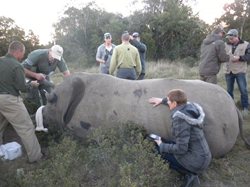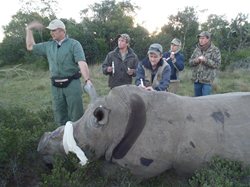Schotia Game Reserve, Eastern Cape, South Africa. It has been two weeks since a pair of white rhino named Bonnie & Clyde, were poached using, illegally acquired, veterinary drugs. Miraculously they survived the ordeal but both suffered internal tissue damage of varying degrees and concern has rested primarily on the bull, Clyde. After blood tests revealed that indicators of muscle trauma were severe enough to threaten further organ damage and possibly even liver and kidney failure, they have been monitored continuously by staff and owners of Schotia.
The risks of repeated anaesthetics in order to treat Clyde with injectable drugs was considered too high and so other forms of medication had to be considered. Apart from recording detailed hourly information on their progress, the Schotia monitoring team managed to coerce Clyde into taking daily doses of an anti-inflammatory liquid treatment added to a lucerne supplement. Dr William Fowlds, of Investec Rhino Lifeline, said “this formulation is registered for use in horses but appears to be effective in rhino as well. Both rhino seem to be doing very well under the circumstances. Clyde still has damage to his right eye which may yet require attention, but we are trying to handle them as little as possible during this delicate phase of their recovery.
In spite of all they have been though, they both appear to be doing remarkably well.” Dr Fowlds added that “it is still too early to talk of a positive prognosis but every good day takes us another step away from a tragic ending.”
Schotia Game Reserve, Eastern Cape, South Africa. The two white rhino, named Bonnie & Clyde who were poached earlier in the week, but miraculously survived, received treatment two days ago and their progress has been closely monitored by reserve owners ever since.
Yesterday they were still apart and clearly still visibly stressed by their ordeal. The bull, Clyde, appeared to be in a worse condition than Bonnie, and although he was walking around in the thicker bush, his movements were sluggish and he seemed to be in some pain.
Today they have joined up which is good news and reserve staff report that they have been at the waterhole, which is also positive. However, the first results of blood taken at the time of the treatment are very worrying and our fears of extensive muscle damage are confirmed in these preliminary results.
Dr William Fowlds, of Investec Rhino Lifeline, has received the 1st blood results from Idexx Laboratories in Cape Town and they indicate that measurements of muscle trauma are in excess of 700% higher than the normal range. Dr Fowlds said, “The concern here is that this muscle damage may translate into kidney damage as dangerous chemicals are released into the blood stream from these traumatised cells. Sometime these effects are only apparent several weeks later which means we still have a long way to go before we know their fate”.
Other worrying indicators are that even at that stage, there were early indications of liver trauma. Dr Fowlds added, “As thick skinned pachyderms, there is a lot that goes on under the surface which is very difficult to see from the outside. Rhino anaesthetics need to be very carefully monitored and adjusted within a few minutes as their blood oxygen levels plummet quickly. In this case, they were left to die by the poachers and we suspect that they would have been under for between 12 and 36 hours before they were found. The fact that they are still alive is a miracle”.
A decision will be taken within the next two days regarding further supportive treatments.
Schotia Game Reserve regrets to announce the poaching of two rhino on the reserve. It is not clear when the poaching occurred as both animals could not be located for more than a day leading up to their being located, late yesterday afternoon of the 30 May. The bull, known as Clyde, was discovered first, heavily drugged and in a state of shock. An initial search for Bonnie, the female, proved fruitless and it was feared that she would be found dead.


Schotia, immediately called for the veterinary assistance of Dr William Fowlds, of Investec Rhino Lifeline, who arrived supported by the helicopter services of Grant Soule of Aptrac. A short while later Bonnie, was found, very dazed in thick bush.
Both rhino were treated by Dr Fowlds and we can report that they have survived the night and have been located alive this morning. Dr Fowlds said, “Both these rhino are extremely fortunate to be alive. It is suspected that they were darted by the poachers. Treatment of their damaged horn bases is expected to be successful but what is uncertain at this stage is how much internal trauma they have sustained due to the extended period they would have lain under potent anaesthetic drugs. In previous cases this has led to death weeks and sometimes months later. Both rhino have some trauma to their eyes which is being monitored. Blood samples have been sent to Cape Town in an effort to assess the degree of internal complications.”
This incident is the first poaching incident to take place in the EC in 2013 and is a grim reminder that poachers are still very active in the area. More than half the rhino poached in the Eastern Cape have been darted indicating the very organised and well planned nature of these criminal attacks. It is very unlikely that well organised crimes of this nature can take place without the knowledge of people in Eastern Cape communities and so we appeal to the public to please come forward with information to assist in stopping this devastation of these national treasures.
Dr Fowlds added that public outrage and sympathy following previous incidents which have taken place in the province have been overwhelming. Rhino Projects born out of the Eastern Cape are currently active in other parts of SA and even up in to Botswana. Dr Fowlds, through Investec Rhino Lifeline, Chipembere Rhino Foundation and the Wilderness Foundation, which are all EC based projects, is busy supporting the recovery of four other survivors in the Hoedspruit area who were shot 3 weeks ago. Their treatment is on-going and is completely funded by these organisations and public support.
The official death toll in SA so far for 2013 stands at 367 and projections indicate that the 2012 figure of 668 will be surpassed before the final quarter of 2013.
Anyone with information can contact the Wilderness Foundation Rhino Hotline on: 0786969494